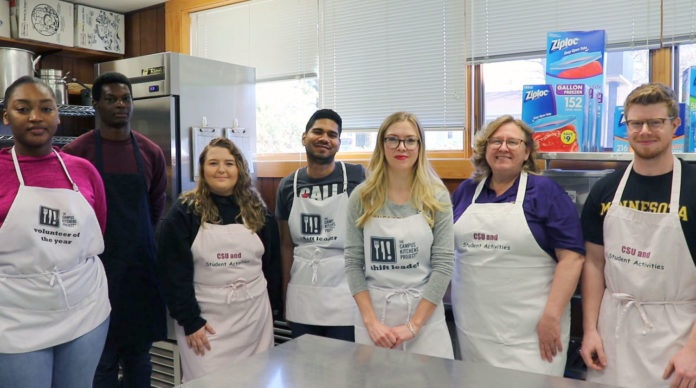Strengthen bodies, empower minds and build communities.
A mission statement to live by when those around you are suffering, and one Minnesota State University, Mankato, strives to fulfill. At MSU-Mankato, students, faculty and many more come together to help those facing food insecurity in the community through Campus Kitchen.
Wasteful to tasteful
Campus Kitchen, established in 2005, is a student-led food rescue program that seeks to fight food insecurity in the greater Mankato area by gathering and redistributing food that would otherwise be thrown out. The name derives from the nonprofit organization, The Campus Kitchens Project, which has since shifted the precedence of food insecurity-related issues, removing the food rescue facet from the program.

“Unfortunately, the national program chose to focus on other priorities and has let go of this,” said Karen Anderson, Assistant Director of Community Engagement at MSU Mankato. “We think this is still very valuable, and we’ll continue to serve the community doing this work.”
Anderson not only connects students to volunteer opportunities and creates community engagement projects, but she also manages the CK program. As an MSU-Mankato alumna with a background in political science and college student personnel, Anderson couldn’t help but get a taste coming from the kitchen.
“I read about CK in the alumni magazine and said, ‘I want to run that program someday,’ and here I am!” Anderson explained.
It’s really important to the future of our country that each generation of people recognize the importance of civic involvement. CK is just one way for them to learn that and to see tangible results.Karen Anderson
Since 2014, Anderson has carried out the role of associate director, supporting CK’s student leaders and focusing on other managerial duties, such as funding, collecting, and distributing. CK is funded by donations, grants, and fundraisers: a daunting way to support a program when you hold a lot of responsibility.
“As with any nonprofit, it’s about what the donors value and our accountability to the community,” Anderson said.
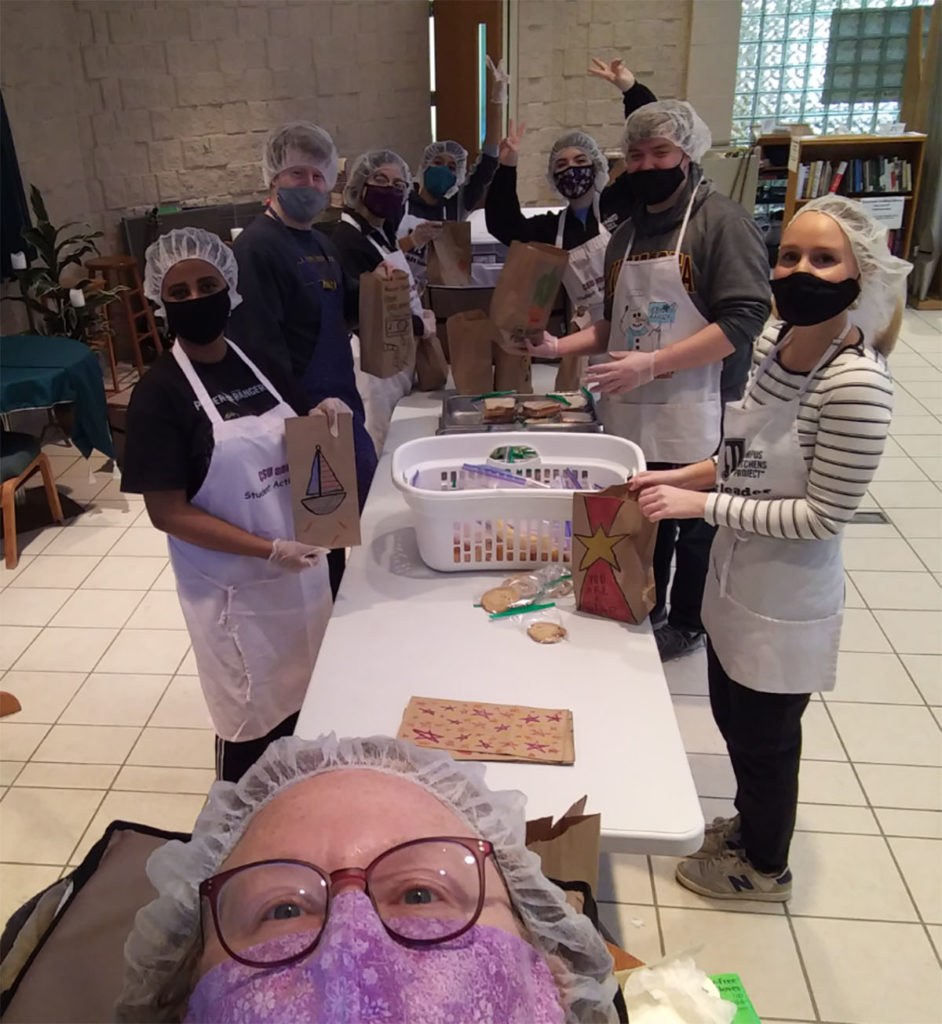
A lot of generosity
While the funding process may be daunting, it’s offset by the goodwill of in-kind donations by businesses and agencies like Chipotle, Olive Garden, Red Lobster, Panera, the University Dining Center, Gustavus Adolphus Dining, and the ECHO Food Shelf.
“I feel very fortunate,” Anderson said. “We have some wonderful partners who see the importance of addressing community issues, and we are just the vehicle to connect their generosity to those who need it.”
Generosity is also shown by student volunteers: the heart of the CK program. Anywhere from food recovery, food preparation, packaging and distribution to kitchen cleanup, they see that the work’s accomplished. In return for their hard work, students gain a life experience like no other.
“You begin to see how systems operate and how they impact individuals,” Anderson explained. “It restores faith that we really can make a measurable difference in the lives of people in our community.”
These experiences and learning opportunities are open to all who are interested. While many student organizations at MSU-Mankato require certain skills and abilities of their members, volunteering requires only one thing: the willingness to be a part of something bigger than themselves.
“You don’t need any special degree to know how to make a peanut butter and jelly sandwich, so students learn that they can make a huge impact by taking simple actions, by being the bridge between sustainability and food insecurity,” Anderson said. “To me, it’s a beautiful example of synergy.”
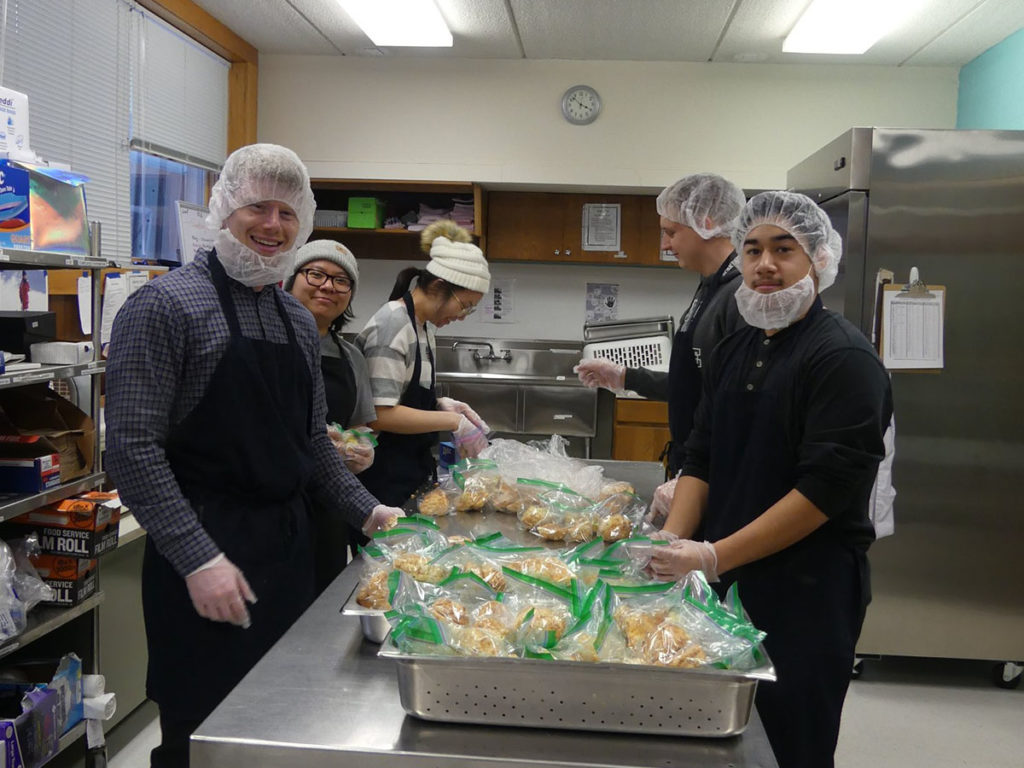
Recipe for success
First, CK harvests and processes food from restaurants that have extra to spare. Shift leaders begin the bulk of this process on Wednesdays, arriving at donation locations with a cooler bag to fill with their excess food. After a quick signature, local restaurants have given back to the community in a way they couldn’t have otherwise.
“They may want to give it to people who are facing food insecurity themselves but may not have the capacity to package and distribute that,” Anderson said. “That’s where we come in!”
Once back at the kitchen, the donations are weighed, logged and processed. On Thursdays, meals are prepared based on the current food inventory and serving suggestions made by the student meal planner and packaged in assembly-line fashion by student volunteers into to-go containers or brown paper bags. With being in such close contact with the food, several safety precautions have been taken into account for COVID-19 concerns.
“We were already washing hands on a regular basis, constantly cleaning and sanitizing surfaces, etc.,” Anderson explained. “Our team takes the reduced number of volunteers and the addition of face masks in stride since it’s expected in other areas of their life, too.”
With safety still in mind, the food is finally distributed and delivered with the help of CK’s agency partners like the ECHO Food Shelf, Maxfield Place, Open Door Health Clinic, Loaves and Fishes, and Campus Cupboard to serve the youth, elderly and anyone in need of food support. Whether in to-go containers or brown paper bags, giving back to the community and setting it up for a well-fed future is all that matters at the end of the day.
“I enjoy seeing a job well done and knowing that I’m passing the torch on to others who can take this model, or even part of it, on to other communities,” Anderson said. “It gives me hope for the future.”
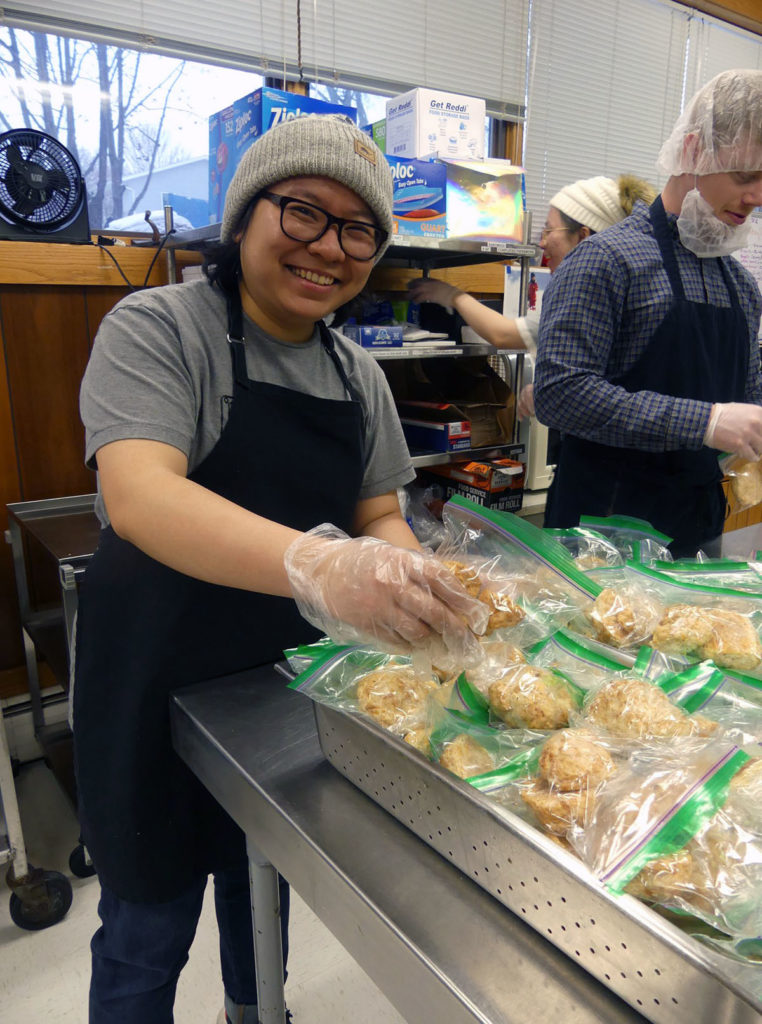
Withstanding the heat in the kitchen
The world came to a halt when COVID-19 emerged, and so did the operations at the kitchen. MSU-Mankato set pandemic guidelines for on-campus buildings and activities to help mitigate the potential for a COVID-19 outbreak, leaving CK with no volunteers. This left Anderson to do the harvesting, processing and delivery of food on her own.
“While it was stressful, I felt content knowing that I did what I was able to do and was the connector between people who have resources and people who need resources, especially when the pandemic first hit,” Anderson said.
Donations were also difficult to come by as they were abundant early pandemic but have since slowed. Food waste, once so plentiful, is now made up of a few crumbs.
“When the pandemic first hit, many restaurants realized the potential impact and made donations of large amounts of food,” Anderson explained. “[Now,] restaurants have fewer customers, so they are more cautious with food prep to reduce their amount of food waste.”
One of my favorite sayings is, ‘action without reflection leads to burnout; reflection without action leads to cynicism’Karen Anderson
A smart move on their part, but it’s one not in favor of CK since less waste means less to give back to the community. Rather than focusing on the negatives during these trying times, Anderson instead reflects on her work at CK to make sure it’s been nothing but effectual.
“One of my favorite sayings is, ‘action without reflection leads to burnout; reflection without action leads to cynicism,'” Anderson said. “I try to make time to really think about what I’m doing to make sure it is manageable and make sure the impact of what is being done is actually helpful. Keeping that focus helps me to keep calm and carry on.”
Carrying on is, indeed, what they did. In August 2020, CK’s operations resumed, although at limited capacity. With the university’s status at orange, CK could safely have one volunteer in the kitchen at a time. The student volunteers persevered, agreeing they would cover the shifts themselves.
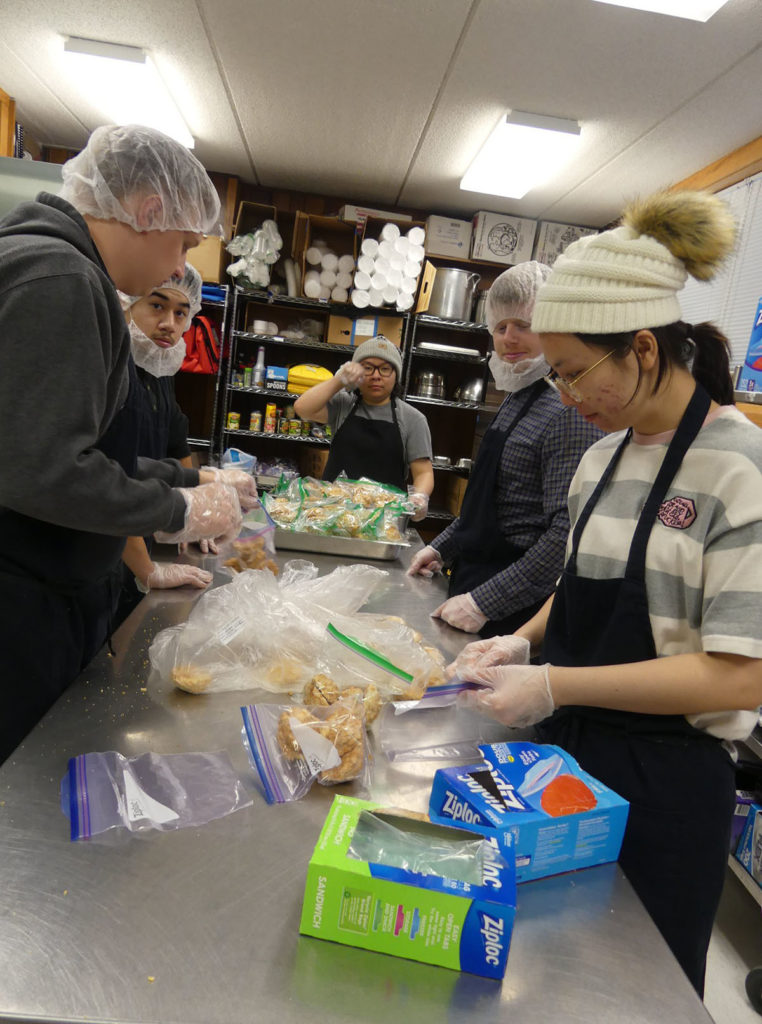
“They are a dedicated bunch who want to see the program continue, and I couldn’t be prouder,” Anderson said. “We absolutely could not do what we do without them!”
Looking towards the future, Anderson hopes to build student leadership and educate students on the importance of giving back to their community through programs like CK, as their significance is something that Anderson cannot emphasize enough.
“I would want every student to participate in a program where they have to work together to address community concerns [and] to contribute to something that’s larger than themselves,” Anderson explained. “It’s really important to the future of our country that each generation of people recognize the importance of civic involvement. CK is just one way for them to learn that and to see tangible results.”

